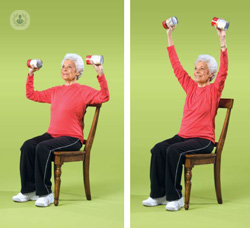Ten steps to prepare for hip or knee replacement surgery
Written by:Earlier, safer and easier recovery has been made possible by technological and surgical advancements. The key to a successful recovery is careful preparation. The following steps are what Mr William Bartlett, a leading orthopaedic surgeon, considers to be essential when getting ready for hip or knee replacement surgery.

1. Do your research
The more you know ahead of time, the more informed your treatment decisions will be. When you are doing any research online, it is important to remain sceptical. You should also research how experienced your surgeon is, as surgeries performed by less experienced surgeons could result in a less successful procedure. More than numbers though, choosing a surgeon should also take into account availability, location and bedside manner.
Once you have chosen a surgeon, it is important to understand what the surgery entails, what the risks are and what alternative treatments are as well. If you are still uncertain, it is advised that you have another consultation or seek a second opinion.
2. Taking exercise
Exercising in the run up to surgery will greatly facilitate your recovery. Non-impact activities such as swimming and cycling are great for increasing fitness and muscle function. In the last few weeks before surgery, it is recommended that you do some strengthening exercises as well to improve your arm and core strength. To maintain motivation, some people find it helpful to use technology to track progress, and there are plenty of phone apps that can do this.
3. Get healthy
It is really important to get as healthy as possible before surgery. You can do so by:
- Stopping smoking
- Reducing alcohol intake (one standard-sized drink per day)
- A healthy, balanced diet
- Consider iron and vitamin supplements
4. Lose weight
If you are overweight, losing some weight can make recovery easier. Even though exercise is challenging when you have reduced mobility, steps two and three above should help with this. However, it is important not to resort to a ‘starvation’ diet. For patients who are very overweight, it can be advised to delay surgery, or indeed to consider weight—loss surgeries prior to having a hip or knee replacement.
5. Review long-term health conditions
Ensure any long-term health conditions are well-controlled. Conditions such as diabetes, heart conditions or raised blood pressure should be looked at and treated before surgery.
6. Find a treatment buddy
Your friend or loved one should be on hand to provide practical assistance and help you keep organised and motivated. They should attend appointments with you, ask questions you have overlooked, take notes and generally support you through the process. Ideally they will be able to take you home from hospital and be on hand in the first couple of weeks after surgery to help you with practical matters at home. Sometimes, if you do not have someone to help you, it can be helpful to arrange a short stay in a rehabilitation centre.
7. Inform work
The amount of time you will need to take off work varies, and it can depend on personal motivation, level of fitness, the nature of the work and how the patient makes their way to their job. It will usually be necessary to take up to two months off work and after this to make a phased return.
8. Arrange your home
In the weeks leading up to your surgery, it is really helpful to get organised at home. Some measures to do so are:
- To stock-up on food
- De-clutter the house
- Remove trip hazards
- Re-organise kitchen cupboards so that commonly used items are easily accessible
- An armchair should be easily accessible, and sofas should be avoided initially
- There are also certain gadgets that can make life easier, such as raised toilet seats
- Install some handrails in the bathroom or on the stairs
- Make sure your bed is fitted with clean sheets and fresh towels are ready
9. Last minute arrangements
If you have a new illness before surgery, let the medical team know immediately. Before coming to surgery, you should pack a bag with all the essentials you would need for a few days away from home, but avoid bringing valuables. You should bring loose, comfortable clothes, slip-on shoes and a good book! Before surgery you would have been advised to stop certain medications and avoid taking herbal medicines.
10. Coming in for surgery
On the day of surgery you should:
- Take a shower
- Not shave or apply perfumes or lotions
- 6 hours before surgery, stop eating, but stay hydrated with water
- 2 hours before surgery you should have nothing to eat or drink
There are many different ways to prepare for hip or knee replacement surgery, but the most important thing is to consider how the operation will affect you and what you can do to affect your chances of having a smooth, easy transition from the hospital to back home.
If you are considering hip or knee replacement surgery and would like to learn more, make an appointment with a specialist.


